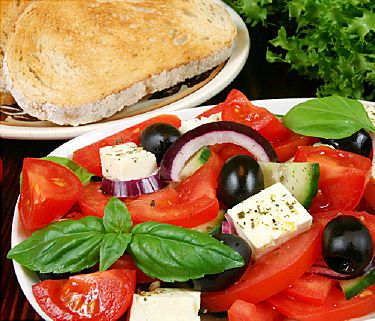The Mediterranean Diet: What It Is
The Mediterranean diet has long been considered one of the healthiest diets on the planet - and rightfully so.
For thousands of years, residents along the Mediterranean coast have enjoyed the delicious diet, leisurely dining, and engaging in regular physical activity. They don’t think of their eating habits as a diet plan; it’s simply a way of life that can lead to long, healthy lives with less chance of chronic disease.

A growing body of research continues to prove that eating a diet rich in plant foods and healthy fats is good for you. Studies show that following a Mediterranean diet protects against the development of heart disease, metabolic syndrome, some types of cancer, obesity, type 2 diabetes, dementia, Alzheimer’s disease -- and also leads to a longer lifespan.
The health effects of a Mediterranean diet have been studied extensively in the last 10 years, resulting in better science and more clinical evidence.
“There are numerous health benefits, the strongest and most profound evidence is the protection of cardiovascular disease and diabetes,” says Dariush Mozaffarian, MD, DrPH, a researcher, cardiologist, associate professor, and codirector of the cardiovascular epidemiology program at Harvard School of Public Health.
Health benefits are not attributed to diet alone; it is the whole package, which includes the lifestyle of the people who live along the Mediterranean.
“In addition to the wide variety of delicious, nutrient-rich foods -- the protective effect of leisurely dining, family involvement, and physical activity make the Mediterranean diet even more powerful,” says Connie Diekman, MEd, RD, author of The Everything Mediterranean Diet Book.
What Is a Mediterranean Diet?
"The Mediterranean Diet is a lifestyle where good taste meets good health," says Sara Baer-Sinnott, president of Oldways, the nonprofit food and nutrition group that first introduced the Mediterranean Diet Pyramid in 1993.
There is no single Mediterranean diet. Instead, each region across Europe -- from Spain to the Middle East -- customizes the basic diet to take advantage of food availability and cultural preferences.
Similarities include a reliance on plant foods such as vegetables, fruits, beans, whole grains, nuts, olives, and olive oil along with some cheese, yogurt, fish, poultry, eggs, and wine. These foods form the basis of the plan and provide thousands of micronutrients, antioxidants, vitamins, minerals, and fiber that work together to protect against chronic disease.
Most of the foods on the plan are fresh, seasonal whole foods - they're not processed. Preparation methods tend to be simple; foods are rarely deep-fried.
Only small amounts of saturated fat, sodium, sweets, and meat are part of the plan.
The Mediterranean lifestyle also includes leisurely dining and regular physical activity, which are an important part of the equation.
No comments:
Post a Comment